Director's Greetings
The Institute of Russian Studies at Hankuk University of Foreign Studies was established as the Institute of the Soviet Union and East European Issues on January 13, 1972 in Seoul. In those days, the international community was dominated by cold war ideology, which made any communication or exchange between the Republic of Korea and the Communist bloc virtually impossible. The IRS was the first research center that began collecting and examining periodicals from the Soviet Union, North Korea, and other socialist states. Being the only Soviet Union and East European Issues research institute in Korea, the IRS was able to obtain an unrivaled position in this field. In a country where little research was being conducted on socialism, the IRS exerted a strong influence on the direction of these studies, leading the discourse on communism. From the early 1990s the IRS began to narrow its research subjects to Russia and the CIS region. Concentrated studies on the economies, politics, societies and cultures of the CIS region and Russia became the focus of the Institute. In 1993, the Institute officially changed its name to the Institute of Russian Studies, and in July of 1999, due to space constraints, the IRS relocated to Hankuk University’s Global Campus in Yongin.
The IRS regularly invites distinguished scholars from Russia and other parts of the world to give special talks.
Invited speakers come from diverse academic fields, including politics, economics, and literature.

The Institute of Russian Studies at Hankuk University of Foreign Studies was established as the Institute of the Soviet Union and East European Issues in 1972. The institute was South Korea’s first research center to begin collecting and examining information from the Soviet Union and other communist countries. The institute exerted a strong influence on the direction of communist studies and grew to be as a leading institute conducting research on the Soviet Union in South Korea. In 1993 the institute officially changed its name to the Institute of Russian Studies and has continued to carry out its research on the Russia Federation, Central Asian countries, and other Eurasian regions.
Following the successful completion of the 10-Year Humanities Korea Research Project (2009-2019), “Reconstructing Dimensions of Russian Humanities: A Korean Perspective,” funded by National Research Foundation of Korea, the IRS started a new 7-year Humanities Korea Plus Project (2019-2026), “Re-perception of Russian Humanities: The World in Russia, Russia in the World.”
Today, Russia is increasingly showing its new presence and influence on the international arenas, and has distinguished itself from the existing one. Using academic capacity, research resource, and rich experiences accumulated over the past half century, the IRS pursues research on Russia’s influences over the world and the world’s influence on Russia, from global perspectives. In doing so, the IRS aims to measure Russia’s influence on the Northeast Asian region, including the Korean peninsula, in a more accurate manner, by analyzing characteristics of Russian national identities.
The IRS aims to be a world-class research institute, rather than resting on the laurels as the best in South Korea. I appreciate the continuing support and interest from Hankuk University of Foreign Studies, the Alumni Association of Russian Language and Russian Studies Departments, and the Research Foundation of Korea. Lastly but not least, I would like to express my sincere respect to and encouragement for the eleven IRS professors, whose exceptional research efforts place them at the forefront of their fields.
Thank you
Sang Young Pyo
Director
Institute of Russian Studies
Hankuk University of Foreign Studies

